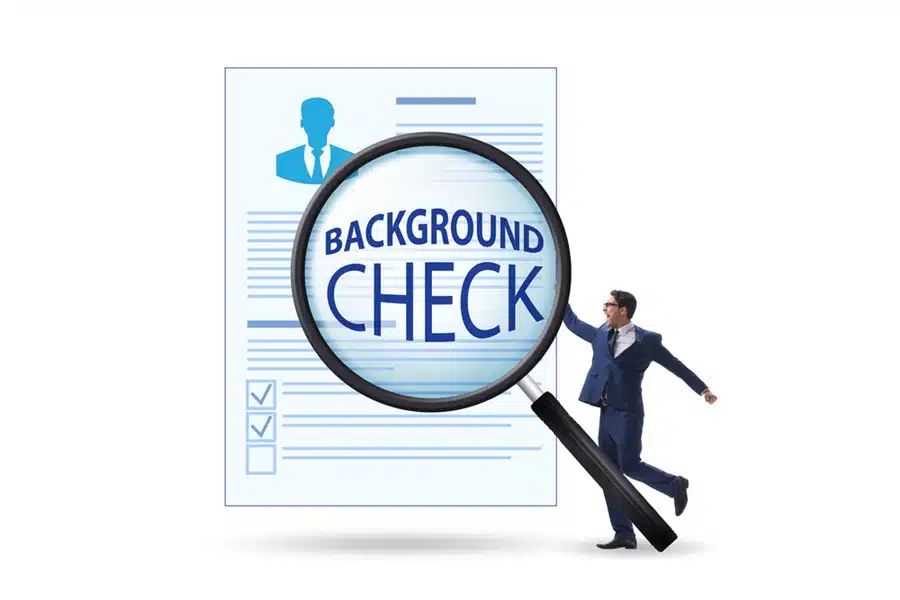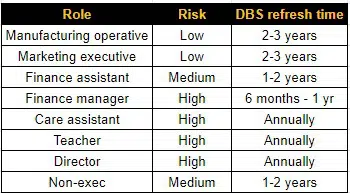
Many employers use Disclosure and Barring Service checks as part of their recruitment risk reduction process but it is a little known fact that they are good only for the day they are done.
For example, if you carry out a basic check today on one of your employees and they are convicted of an offence tomorrow then you’ll never know.
This means that you could have employees working in your business right now who have undisclosed convictions which could lead to your business unintentionally invalidating your insurance or breaking the rules if you are in a regulated industry.
The obvious answer is to refresh your DBS checks for all of your employees but the question is how often should you do it?
In this post:
- The risk aspect
- The cost aspect
- DBS checks – balancing the two
- Practical issues
- Summary
The risk aspect
The whole point of a DBS check is to reduce risk.
You wouldn’t want someone with a fraud conviction working with your accounting system any more than you’d want someone with multiple theft offences on their record working in the warehouse.
Naturally, it is possible that people can reform and where offences have taken place many years ago they become less relevant to the situation now, but the important point is that you need to know about it so you can make an informed decision.
For many businesses, there is also a legal duty to check people against the barred list if they are working with children or vulnerable people, so a DBS check reduces the risk of any regulatory problems.
So a business manager needs to look at the risk of each role and whether a check is justified. If you decide that a DBS check is appropriate then you need to assess which level of check you want to do.
Once you have risk-assessed each role then you can look at the ongoing risk attached to the role.
In some cases, a DBS check is a check on the honesty of the individual concerned. If they lie on their job application then there is a possibility that they are inherently dishonest, but on an ongoing basis, a DBS check may not really be appropriate.
By the same token, someone working in a position of trust with access to cash, systems or care service users has to be completely clear from a convictions point of view.
So does the role in question carry a high level of ongoing risk or is it minimal? The more risk then the more often you will want to refresh the DBS check.
The cost aspect
Reducing risk is all well and good but if the cost of carrying out the checks is more than the potential cost of a risk then there’s no point.
The truth is that there is a cost to doing checks, both in terms of the DBS fee but also in terms of your time and the time of the employee.
So whilst risk-averse managers may want people to be checked every week, that really isn’t cost-effective.
DBS checks – balancing the two
So how do you decide how often you should refresh an employee’s DBS check?
You have to remember that a DBS check doesn’t have an expiry date and the government has left it up to employers and trade bodies to set a refresh time limit.
The first thing we’d say is that you should base your decision not on the employee but on the role and you absolutely shouldn’t base it on a person’s attributes such as being young or a foreign worker as you could easily make a choice based on protected characteristics opening up your business to claims of discrimination.
Look at the role and assess how risky it is and how comfortable you’d be if a DBS check came back adverse.
Incidentally, if you’d like some guidance about responses to adverse screenings then check out our post here.
Your response to an adverse screening can tell you a lot about how risky the role is and therefore how often you should refresh your employee DBS checks.
In general, for low-risk roles, we’d say that every 2-3 years is ample for a refresh rota.
However, if you have someone working in a particularly sensitive area then you may wish to shorten this to an annual check or maybe even 6 months.
Many regulators have their own suggestions as to how often you should refresh your information although somewhat surprisingly others leave it up to individual companies.
For example, the CQC which regulates care homes and their workers doesn’t set any guideline for DBS checks but Ofsted that deals with education says that DBS checks more than 3 months old shouldn’t be accepted for new roles suggesting that they consider them to be out of date.
Looking at our customers, the average times that they choose to refresh are as follows;
 Now remember, every case is different so you really do need to take a view on the role in question, your business and your directors’ attitude to risk.
Now remember, every case is different so you really do need to take a view on the role in question, your business and your directors’ attitude to risk.
Practical issues
The first thing to ask is what do your employment contracts say about convictions?
If you have no leeway to dismiss an employee due to a convictions post joining then you are in a bit of a bind.
There needs to be a high-level discussion of whether in practice you would dismiss someone and if that would be lawful. If you decide that you would want the option then it needs to be included in people’s contracts.
You also need to be aware of GDPR requirements. You can’t collect data about an individual just because you feel like it and you can’t use it for other reasons than what it was collected for.
So from a GDPR point of view, you must have a good reason for collecting the information and carrying out the checks.
If you have a large workforce then you also need a practical way of conducting the refresh and making assessments as to when they should be done.
For smaller businesses, just refreshing individually using the government website works fine but the more people you have, the more time it takes out of your day.
Here at Checkback, we have developed our own DBS software that reduces the burden on hard-pressed HR managers and decreases the time needed to set the process in motion.
If you’d like to find out more about our DBS service and how it can help then call us now on 0144 281 6333, email us at solutions@checkback.co.uk or fill in the form to the right of this blog and we’ll get right back to you.
The DBS has also introduced an update service costing £13 per year that keeps certificates up to date, however, the employer does still need to log on and view the information.
In summary – how often should you refresh your DBS checks?
For low-risk roles, the answer is around 2-3 years. For higher-risk roles then this should be shortened depending upon the job in question.
Remember that there is no standard time that your company needs to refresh its DBS checks, it really is down to your own specific circumstances.
If you’d like to talk to us about our DBS service or any aspect of background checking from qualifications to reference checks then why not call us on 0144 281 6333, email us at solutions@checkback.co.uk or fill in the form to the right of this blog and we’ll get right back to you.

